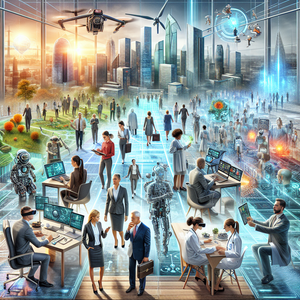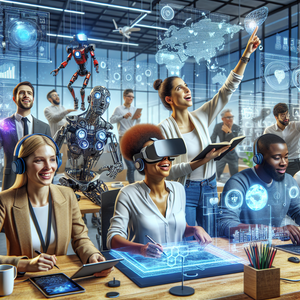
Thriving in a Shifting Workforce: Careers That Will Define the Future of Work
The modern workforce is undergoing a seismic transformation driven by rapid technological advancements, evolving employee expectations, and shifting economic realities. By 2027, the World Economic Forum estimates that nearly a quarter of all jobs will experience significant change, with millions of roles either emerging or disappearing due to automation and other disruptive forces. These changes present both opportunities and challenges, such as labor shortages in critical sectors, the urgent need for reskilling and upskilling, and the growing demand for meaningful and inclusive workplaces.
Job Summaries:
Workforce Redeployment Specialist:
- Workforce Redeployment Specialists match existing employee skillsets with evolving organizational needs, ensuring talent is retained and layoffs are minimized.
- They design training programs and collaborate with HR teams to help employees transition into new roles while maintaining morale and productivity.
- Key skills include HR expertise, organizational psychology, analytical thinking, and communication skills.
- Their impact includes mitigating layoffs, retaining institutional knowledge, and ensuring operational efficiency during transitions.
Future of Work Strategist:
- Future of Work Strategists guide organizations in navigating workforce disruptions like automation and demographic shifts.
- They analyze trends and align them with business goals to keep companies competitive.
- Key skills include market research, strategic planning, data analysis, and change management.
- Their impact is to position organizations to adapt proactively to evolving workforce dynamics.
Reskilling and Upskilling Program Manager:
- Reskilling and Upskilling Program Managers design training initiatives to bridge skill gaps, ensuring employees remain valuable contributors as job requirements change.
- Key skills include project management, instructional design, and workforce development.
- Their impact includes preparing employees for future roles, reducing turnover, and addressing skill mismatches.
Automation Impact Analyst:
- Automation Impact Analysts evaluate roles at risk of displacement due to automation.
- They analyze costs and benefits.
- They recommend strategies to support affected employees.
- Key skills include data analysis, workforce planning, and expertise in emerging technologies.
- Their impact is to guide organizations in implementing automation responsibly while minimizing negative impacts on employees.
Employee Experience Designer:
- Employee Experience Designers create workplace environments that foster engagement, purpose, and growth.
- They use employee feedback and culture studies to design initiatives that enhance job satisfaction and retention.
- Key skills include HR expertise, design thinking, and organizational psychology.
- Their impact includes improving employee well-being, retention, and organizational performance.
Labor Market Analyst:
- Labor Market Analysts analyze employment trends and forecast supply and demand to provide actionable insights for businesses.
- Key skills include economics, data science, and business analytics.
- Their impact is to inform hiring strategies, training programs, and workforce development initiatives.
Workforce Development Consultant:
- Workforce Development Consultants advise organizations on strategies to recruit, train, and retain talent.
- They address skill mismatches and labor gaps through tailored solutions.
- Key skills include public policy expertise, consulting, and workforce planning.
- Their impact is to facilitate economic growth and prepare industries for workforce transitions.
Career Transition Coach:
- Career Transition Coaches provide personalized guidance to employees navigating job changes due to layoffs, automation, or aspirations.
- They assist with resume optimization and career planning.
- Key skills include career counseling, HR expertise, and interpersonal communication.
- Their impact is to support workers in finding meaningful opportunities and transitioning successfully into new roles.
HR Technology Specialist:
- HR Technology Specialists design and implement digital tools to streamline workforce management, such as AI-driven recruiting platforms.
- Key skills include IT expertise, HR knowledge, and familiarity with emerging tech trends.
- Their impact is to enhance workforce efficiency and agility through innovative technology solutions.
Diversity and Inclusion Officer:
- Diversity and Inclusion Officers implement equitable practices, bias training, and inclusive hiring policies to foster a culture of belonging.
- Key skills include sociology, HR expertise, and diversity metrics analysis.
- Their impact is to create inclusive environments that boost innovation and collaboration.
Workforce Sustainability Coordinator:
- Workforce Sustainability Coordinators focus on long-term employee wellness and organizational resilience.
- They develop health initiatives and environmentally conscious practices.
- Key skills include sustainability expertise, HR knowledge, and project management.
- Their impact is to enhance employee retention while promoting sustainable business practices.
Remote Work Policy Advisor:
- Remote Work Policy Advisors craft strategies to optimize productivity and collaboration in distributed teams.
- They design policies balancing flexibility with compliance.
- Key skills include organizational development, HR expertise, and employment law.
- Their impact is to help businesses transition to flexible work models while maintaining high performance.
Talent Mobility Specialist:
- Talent Mobility Specialists create pathways for internal career growth, including promotions and international assignments.
- They are crucial for workforce redeployment strategies.
- Key skills include HR expertise, career development, and organizational psychology.
- Their impact is to retain top talent and align workforce capabilities with organizational goals.
Generational Workforce Consultant:
- Generational Workforce Consultants address managing multigenerational teams by fostering collaboration and understanding across age groups.
- Key skills include sociology, HR, and generational psychology.
- Their impact is to promote communication and collaboration across diverse age groups.
Future Workforce Data Analyst:
- Future Workforce Data Analysts use predictive analytics to forecast labor market trends, helping organizations anticipate changes.
- Key skills include data science, economics, and advanced analytics tools.
- Their impact is to equip businesses with foresight to stay competitive in a rapidly evolving job market.
The rapidly changing nature of work demands action from both organizations and individuals. Companies must prioritize upskilling programs, embrace workforce redeployment strategies, and foster inclusive and sustainable workplace cultures. Meanwhile, employees should focus on cultivating in-demand skills such as data analysis, project management, and adaptability to new technologies. By embracing innovation and preparing for change, we can collectively shape a future of work that is dynamic, inclusive, and prosperous.
Explore More Jobs

